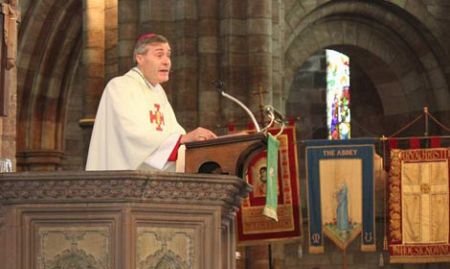UK bishop urges ‘general mobilisation’ to defend life and family
(24/09/2014) Family is like a “house” that shelters the “precious gift of human life” and “the first and vital cell of society,” an English bishop said on the weekend. Bishop Mark Davies, head of the diocese of Shrewsbury, told pilgrims gathered for an annual pro-life pilgrimage to the Marian shrine of Walsingham in Norfolk on Sunday, “On the health and strength of this first cell of society rests not a political union but those timeless bonds which hold human society itself together.”
“The well-being of society will always depend on the foundation of the family,” he added, calling for a general “mobilisation” of Christians and likeminded people to defend the natural family and the sanctity of human life in the face of increasing threats.
Bishop Davies added that it will require “tireless work in our time” to “uphold the sanctity of the family and affirm the value of every human life from conception until natural death.”
The shrine of Walsingham was one of the largest and most important pilgrimage shrines in Medieval Europe from the mid-11th century to the time of its destruction by King Henry VIII. It was built originally as a replica of the house of the Holy Family in Nazareth and was popular as a pilgrimage destination for those who could not travel to the Holy Land after its conquest by Islam. It has recently become the focus of an annual pilgrimage for Catholics and others who pray for a restoration of the moral law regarding the family in Britain.
Bishop Davies said, “Walsingham reminds us, when we begin to rebuild the neglected fabric of the family founded on marriage. It is precisely this ‘crisis of the family in the context of evangelisation’ which Pope Francis wishes us to address in next month’s worldwide, Synod of Bishops in Rome.”
Bishop Davies reiterated the call by Pope John Paul II in his pro-life encyclical Evangelium Vitae for “a general mobilisation of consciences and a united ethical effort to activate a great campaign in support of life.”
“We cannot stand idle,” he said. “We are being called even at the eleventh hour to become workers in defence of the sanctity of human life, to re-build all that the Home of Nazareth represented for those who first built this nation.”
“One day we will surely be asked what did we do for the cause of life at this moment of crisis across the western world?” Bishop Davies said. “In our own last hour we will be asked whether we stood idle all day or whether we prayed and made reparation, used our own voices for the defenceless and gave witness to the sanctity of human and family life.”
Almost immediately after his installation as bishop of the West Midlands diocese of Shrewsbury in 2010, Bishop Davies took the lead among English bishops in denouncing the Culture of Death in the UK. In 2011, he issued a statement in response to the government’s findings of lack of quality care for elderly people in British hospitals, saying, “the neglect of the elderly… may be a symptom of the ‘culture of death’ that has grown out of the loss of respect for human life following decades of abortion.”
He turned up the heat immediately following this when, at a synagogue in Manchester, he said the World War II Holocaust must be a lesson in the defence of all human life. We must fight “the return of eugenic thinking directed against the unborn and the most vulnerable deemed unfit to live or threatened with mercy killing,” he said. This year, he again warned against the resurgence of the “inhuman ideology” that led to acceptance of euthanasia in the 20th century.
Bishop Davies has spoken strongly and repeatedly against the advances of the homosexualist movement, emphasizing that opposition to “gay marriage” is motivated not by “homophobia” but by love for people with same-sex attractions and concern for their wellbeing.


